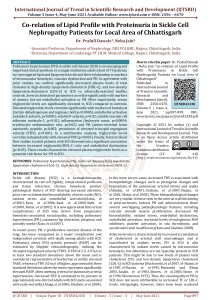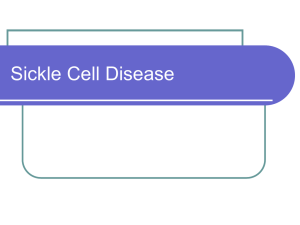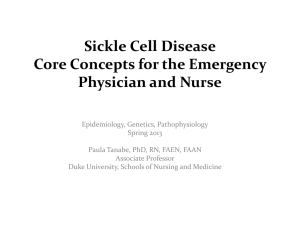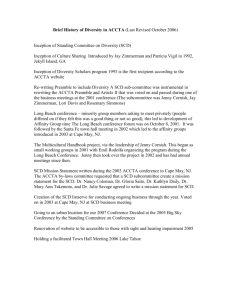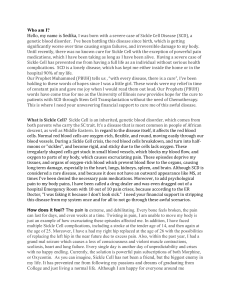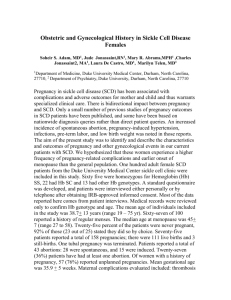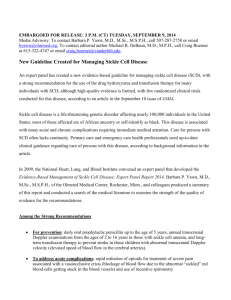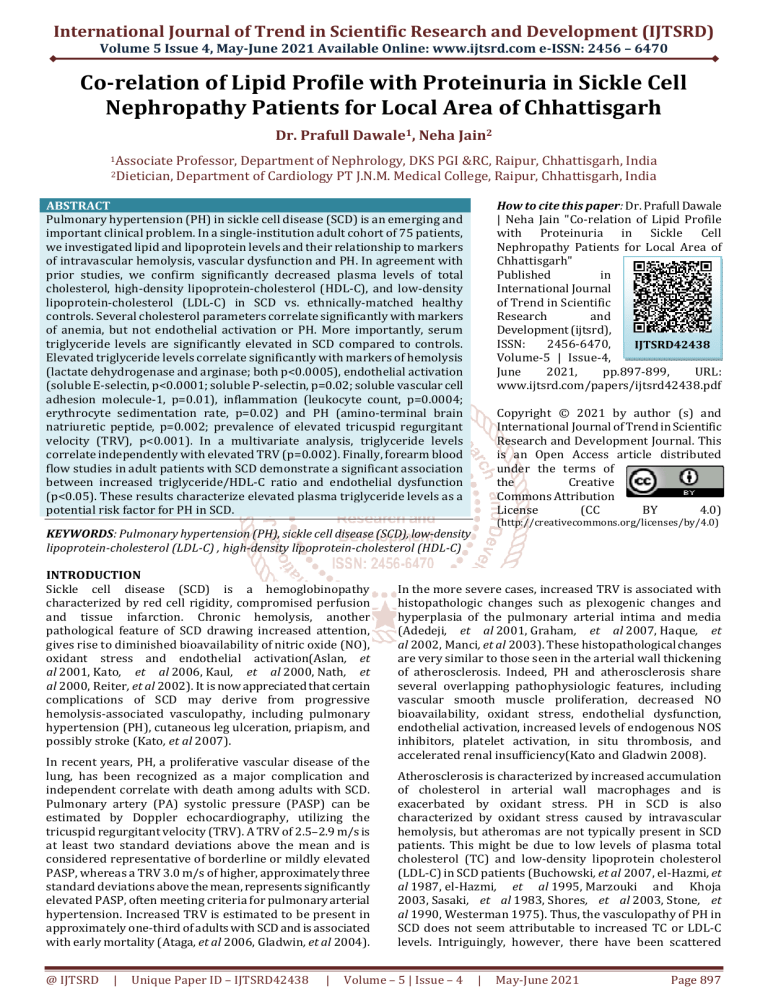
International Journal of Trend in Scientific Research and Development (IJTSRD)
Volume 5 Issue 4, May-June 2021 Available Online: www.ijtsrd.com e-ISSN: 2456 – 6470
Co-relation of Lipid Profile with Proteinuria in Sickle Cell
Nephropathy Patients for Local Area of Chhattisgarh
Dr. Prafull Dawale1, Neha Jain2
1Associate
2Dietician,
Professor, Department of Nephrology, DKS PGI &RC, Raipur, Chhattisgarh, India
Department of Cardiology PT J.N.M. Medical College, Raipur, Chhattisgarh, India
How to cite this paper: Dr. Prafull Dawale
| Neha Jain "Co-relation of Lipid Profile
with Proteinuria in Sickle Cell
Nephropathy Patients for Local Area of
Chhattisgarh"
Published
in
International Journal
of Trend in Scientific
Research
and
Development (ijtsrd),
ISSN:
2456-6470,
IJTSRD42438
Volume-5 | Issue-4,
June
2021,
pp.897-899,
URL:
www.ijtsrd.com/papers/ijtsrd42438.pdf
ABSTRACT
Pulmonary hypertension (PH) in sickle cell disease (SCD) is an emerging and
important clinical problem. In a single-institution adult cohort of 75 patients,
we investigated lipid and lipoprotein levels and their relationship to markers
of intravascular hemolysis, vascular dysfunction and PH. In agreement with
prior studies, we confirm significantly decreased plasma levels of total
cholesterol, high-density lipoprotein-cholesterol (HDL-C), and low-density
lipoprotein-cholesterol (LDL-C) in SCD vs. ethnically-matched healthy
controls. Several cholesterol parameters correlate significantly with markers
of anemia, but not endothelial activation or PH. More importantly, serum
triglyceride levels are significantly elevated in SCD compared to controls.
Elevated triglyceride levels correlate significantly with markers of hemolysis
(lactate dehydrogenase and arginase; both p<0.0005), endothelial activation
(soluble E-selectin, p<0.0001; soluble P-selectin, p=0.02; soluble vascular cell
adhesion molecule-1, p=0.01), inflammation (leukocyte count, p=0.0004;
erythrocyte sedimentation rate, p=0.02) and PH (amino-terminal brain
natriuretic peptide, p=0.002; prevalence of elevated tricuspid regurgitant
velocity (TRV), p<0.001). In a multivariate analysis, triglyceride levels
correlate independently with elevated TRV (p=0.002). Finally, forearm blood
flow studies in adult patients with SCD demonstrate a significant association
between increased triglyceride/HDL-C ratio and endothelial dysfunction
(p<0.05). These results characterize elevated plasma triglyceride levels as a
potential risk factor for PH in SCD.
Copyright © 2021 by author (s) and
International Journal of Trend in Scientific
Research and Development Journal. This
is an Open Access article distributed
under the terms of
the
Creative
Commons Attribution
License
(CC
BY
4.0)
(http://creativecommons.org/licenses/by/4.0)
KEYWORDS: Pulmonary hypertension (PH), sickle cell disease (SCD), low-density
lipoprotein-cholesterol (LDL-C) , high-density lipoprotein-cholesterol (HDL-C)
INTRODUCTION
Sickle cell disease (SCD) is a hemoglobinopathy
characterized by red cell rigidity, compromised perfusion
and tissue infarction. Chronic hemolysis, another
pathological feature of SCD drawing increased attention,
gives rise to diminished bioavailability of nitric oxide (NO),
oxidant stress and endothelial activation(Aslan, et
al 2001, Kato, et al 2006, Kaul, et al 2000, Nath, et
al 2000, Reiter, et al 2002). It is now appreciated that certain
complications of SCD may derive from progressive
hemolysis-associated vasculopathy, including pulmonary
hypertension (PH), cutaneous leg ulceration, priapism, and
possibly stroke (Kato, et al 2007).
In recent years, PH, a proliferative vascular disease of the
lung, has been recognized as a major complication and
independent correlate with death among adults with SCD.
Pulmonary artery (PA) systolic pressure (PASP) can be
estimated by Doppler echocardiography, utilizing the
tricuspid regurgitant velocity (TRV). A TRV of 2.5–2.9 m/s is
at least two standard deviations above the mean and is
considered representative of borderline or mildly elevated
PASP, whereas a TRV 3.0 m/s of higher, approximately three
standard deviations above the mean, represents significantly
elevated PASP, often meeting criteria for pulmonary arterial
hypertension. Increased TRV is estimated to be present in
approximately one-third of adults with SCD and is associated
with early mortality (Ataga, et al 2006, Gladwin, et al 2004).
@ IJTSRD
|
Unique Paper ID – IJTSRD42438
|
In the more severe cases, increased TRV is associated with
histopathologic changes such as plexogenic changes and
hyperplasia of the pulmonary arterial intima and media
(Adedeji, et al 2001, Graham, et al 2007, Haque, et
al 2002, Manci, et al 2003). These histopathological changes
are very similar to those seen in the arterial wall thickening
of atherosclerosis. Indeed, PH and atherosclerosis share
several overlapping pathophysiologic features, including
vascular smooth muscle proliferation, decreased NO
bioavailability, oxidant stress, endothelial dysfunction,
endothelial activation, increased levels of endogenous NOS
inhibitors, platelet activation, in situ thrombosis, and
accelerated renal insufficiency(Kato and Gladwin 2008).
Atherosclerosis is characterized by increased accumulation
of cholesterol in arterial wall macrophages and is
exacerbated by oxidant stress. PH in SCD is also
characterized by oxidant stress caused by intravascular
hemolysis, but atheromas are not typically present in SCD
patients. This might be due to low levels of plasma total
cholesterol (TC) and low-density lipoprotein cholesterol
(LDL-C) in SCD patients (Buchowski, et al 2007, el-Hazmi, et
al 1987, el-Hazmi, et al 1995, Marzouki and Khoja
2003, Sasaki, et al 1983, Shores, et al 2003, Stone, et
al 1990, Westerman 1975). Thus, the vasculopathy of PH in
SCD does not seem attributable to increased TC or LDL-C
levels. Intriguingly, however, there have been scattered
Volume – 5 | Issue – 4
|
May-June 2021
Page 897
International Journal of Trend in Scientific Research and Development (IJTSRD) @ www.ijtsrd.com eISSN: 2456-6470
positive reports of low HDL-C(Sasaki, et al 1983, Stone, et
al 1990) and increased triglyceride(Buchowski, et
al 2007, Kato, et al 2005, Morris, et al 2005)in SCD patients –
features widely recognized in the general population as
important contributory factors in cardiovascular disease.
Investigation of potential roles for low HDL and high
triglyceride levels in the development of PH in SCD therefore
is of interest.
Our group has recently shown that besides decreased NO
bioavailability, factors associated with PH in SCD include
altered apolipoprotein levels and other features shared with
atherosclerosis (Hebbel, et al 2004, Kato and Gladwin
2008, Morris, et al 2005, Yuditskaya, et al 2009). Proteomics
analysis in a small cohort of 56 patients with and without
pulmonary hypertension identified lower apoA-I and
suggested higher apoA-II and serum amyloid A levels in SCD
patients with PH (Yuditskaya, et al 2009). Furthermore, in a
physiological test of endothelial function, patients with
lower apoA-I had a blunted vasodilatory response to
infusion of the endothelium-dependent vasodilator
acetylcholine (Yuditskaya, et al 2009). Patients with SCD
have 3-fold higher levels than healthy controls of the
endogenous NO
synthase inhibitor asymmetric
dimethylarginine, particularly in those patients with
elevated TRV (Kato, et al 2009, Landburg, et al 2008).
Additionally, triglyceride levels have also been suggested to
be elevated in patients with increased endothelial
activation(Kato, et al 2005) and increased plasma arginase
levels(Morris, et al 2005), which in turn were linked to
increased pulmonary pressures.
These findings and the therapeutic potential to modulate
serum lipids with several commonly used drugs prompted
us to investigate in greater detail the serum lipid profile in
patients with SCD and possible relationship to vasculopathic
complications such as PH. In this study, we present our
findings on the status of lipid and lipoprotein levels in a large
adult sickle cell cohort at the National Institutes of Health.
We confirm decreased serum levels of total cholesterol, LDLC and HDL-C and increased serum levels of triglycerides in
SCD patients, compared to ethnically-matched healthy
controls. Decreased total cholesterol, LDL-C and HDL-C were
significantly associated with severity of anemia, whereas
increased triglyceride levels were associated with hemolysis,
vascular dysfunction, and increased prevalence of
pulmonary hypertension.
Materials & Methods: Total75 patients were admitted. All
patients were subjected to routine blood investigations,
blood glucose, urine analysis, routine biochemical
investigations, sickling, lipid profile, ECG, Serum Protein, X
Ray chest, USG(KUB), serum calcium, potassium, chloride,
sodium, phosphorus, albumin, globulin, bilirubin
triglyceride, HDL, LDL, VLDL, SGOT, SGPT, Hb
Electrophoresis, Serum Thyroid levels.
Result:
Mean age of the patients was 26.8 ± 11.6 years.
Males were 29.41% & Females were 70.59%, Ratio
being M: F: 1:2.75.
In patients of Sickle cell nephropathy, 41.4% patients
had deranged lipid profile.
In Sickle cell trait, 27.2 % had deranged lipid profile.
Among Sickle cell disease, all the patients had deranged
lipid profile.
@ IJTSRD
|
Unique Paper ID – IJTSRD42438
|
1.
Derangement in individual lipids are as follows:Hypercholesterolemia(≥ 200 mg/dl) - 7.31 %,
2.
TG(≥160 mg/dl) - 7.31%,
3.
LDL (˃130 mg/dl ) – 2.4%
4.
HDL (≤40 mg/dl) - 58.5% .
Proteinuria in patients of Sickle cell nephropathy:
<1 gm/d = 21.9% had deranged lipid profile.
>1 gm/d = 34.1 % patients had deranged lipid profile.
Conclusion:
1. Lipid derangement is almost seen in all the patients of
Sickle cell Nephropathy.
2.
Hypercholesterolemia & Hypertriglyceridemia
common in males then in female.
is
3.
Low levels of HDL was common in females as compare
to male.
4.
Deranged lipid profile was more common in proteinuria
more than 1gm/dl
REFERENCES
[1] Aslan M, Ryan TM, Adler B, Townes TM, Parks DA,
Thompson JA, Tousson A, Gladwin MT, Patel RP,
Tarpey MM, Batinic-Haberle I, White CR, Freeman BA.
Oxygen radical inhibition of nitric oxide-dependent
vascular function in sickle cell disease. Proc Natl Acad
Sci U S A. 2001; 98:15215–15220. [PMC free
article] [PubMed]
[2]
Belcher JD, Marker PH, Geiger P, Girotti AW, Steinberg
MH, Hebbel RP, Vercellotti GM. Low-density
lipoprotein susceptibility to oxidation and
cytotoxicity to endothelium in sickle cell anemia. J Lab
Clin Med. 1999; 133:605–612. [PubMed] [Google
Scholar]
[3]
Boyanovsky BB, Webb NR. Biology of secretory
phospholipase A2. Cardiovasc Drugs Ther. 2009;
23:61–72. [PMC free article] [PubMed] [Google
Scholar]
[4]
Buchowski MS, Swift LL, Akohoue SA, Shankar SM,
Flakoll PJ, Abumrad N. Defects in postabsorptive
plasma homeostasis of fatty acids in sickle cell
disease. JPEN J Parenter Enteral Nutr. 2007; 31:263–
268. [PMC free article] [PubMed] [Google Scholar]
[5]
Choy E, Sattar N. Interpreting lipid levels in the
context of high-grade inflammatory states with a
focus on rheumatoid arthritis: a challenge to
conventional cardiovascular risk actions. Ann Rheum
Dis. 2009; 68:460–469. [PubMed] [Google Scholar]
[6]
el-Hazmi MA, Jabbar FA, Warsy AS. Cholesterol and
triglyceride level in patients with sickle cell
anaemia. Scand J Clin Lab Invest. 1987;47:351–
354. [PubMed] [Google Scholar]
[7]
el-Hazmi MA, Warsy AS, al-Swailem A, al-Swailem A,
Bahakim H. Red cell genetic disorders and plasma
lipids. J Trop Pediatr. 1995; 41:202–205. [PubMed]
[Google Scholar]
[8]
Galie N, Manes A, Farahani KV, Pelino F, Palazzini M,
Negro L, Romanazzi S, Branzi A. Pulmonary arterial
hypertension associated to connective tissue
Volume – 5 | Issue – 4
|
May-June 2021
Page 898
International Journal of Trend in Scientific Research and Development (IJTSRD) @ www.ijtsrd.com eISSN: 2456-6470
diseases. Lupus. 2005; 14:713–717. [PubMed] [Google
Scholar]
[9]
[10]
Gladwin MT, Sachdev V, Jison ML, Shizukuda Y, Plehn
JF, Minter K, Brown B, Coles WA, Nichols JS, Ernst I,
Hunter LA, Blackwelder WC, Schechter AN, Rodgers
GP, Castro O, Ognibene FP. Pulmonary hypertension
as a risk factor for death in patients with sickle cell
disease. N Engl J Med. 2004; 350:886–895. [PubMed]
[Google Scholar]
Gladwin MT, Schechter AN, Ognibene FP, Coles WA,
Reiter CD, Schenke WH, Csako G, Waclawiw MA,
Panza JA, Cannon RO., 3rd Divergent nitric oxide
@ IJTSRD
|
Unique Paper ID – IJTSRD42438
|
bioavailability in men and women with sickle cell
disease. Circulation. 2003; 107:271–278. [PubMed]
[Google Scholar]
[11]
Gotto APH. Manual of Lipid Disorders: Reducing the
Risk for Coronary Heart Disease. Lippincott, Williams
and Wilkins; Philadelphia, PA: 2003. [Google Scholar]
[12]
Graham JK, Mosunjac M, Hanzlick RL, Mosunjac M.
Sickle cell lung disease and sudden death: a
retrospective/prospective study of 21 autopsy cases
and literature review. Am J Forensic Med
Pathol. 2007; 28:168–172. [PubMed]
Volume – 5 | Issue – 4
|
May-June 2021
Page 899

